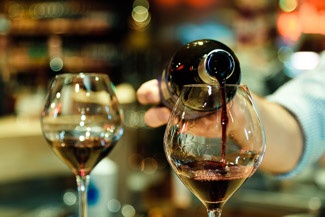Is expensive wine really better?
 Quality undoubtedly comes at a price. But we also know that prices can influence our perception of a product. Studies have shown that the same product can be perceived differently depending on its price. This is called the “marketing placebo effect.” A new study published in Scientific Reports explains the role played by the brain in these sorts of price biases. How can the same person judge the same wine differently simply by changing the price?
Quality undoubtedly comes at a price. But we also know that prices can influence our perception of a product. Studies have shown that the same product can be perceived differently depending on its price. This is called the “marketing placebo effect.” A new study published in Scientific Reports explains the role played by the brain in these sorts of price biases. How can the same person judge the same wine differently simply by changing the price? Previous work carried out by the Franco-German research team (the Cognitive Neuroscience Laboratory / Economic Decision-Making group in Paris and the Center for Economics and Neuroscience in Bonn) showed that the price of a product could affect our expectations and influence our enjoyment (taste, for example) of the product. The same wine will taste better if it has a higher price tag. How can this phenomenon be explained? Neuroscience has shown that the brain’s decision-making and motivation center (the medial prefrontal cortex and ventral striatum) may play an important role in the “marketing placebo effect.” The present study focuses on the brain mechanisms involved in the effect.
The scientists invited 30 participants (15 men, 15 women, average age = 29.6 years) to a wine tasting in an MRI scanner. The participants were asked to taste three 12 euro wines several times. Each time, the (false) price of the wine was shown first (3, 6 or 18 euro). The participants then had to rate the taste of the wine on a scale from 1 to 9. Each experimental condition was repeated 18 times, but rest assured, in total each person only consumed 135 ml of wine (less than one glass)!
What were the findings? As expected, the subjects reported that the most expensive wine tasted better than the cheaper ones. This confirms the assumption that by changing the price, the taste of an identical wine can be perceived differently. This finding was confirmed by measuring participants’ brain activity. Indeed, the researchers remarked that as the price increases, all the areas of the medial prefrontal cortex and ventral striatum were activated. The medial prefrontal cortex appears to be involved in processing price comparisons and thus expectations about the wine, while the ventral striatum forms the core of the brain’s reward and motivation center. For the participant being offered an 18 euro wine, the system is activated and “artificially" increases the taste experience.
In conclusion, the “marketing placebo effect” proves that our brain can deceive us into believing that taste isn’t just in the bottle, it’s also on the bottle’s price tag, packaging, etc. The question ultimately raised by the authors is whether we can train the reward system to be less receptive to this effect. This would likely involve better training our taste perception from an early age.
Source: Liane Schmidt, Vasilisa Skvortsova, Claus Kullen, Bernd Weber, Hilke Plassmann. “How context alters value: The brain’s valuation and affective regulation system link price cues to experienced taste pleasantness”. Scientific Reports, July 2017







